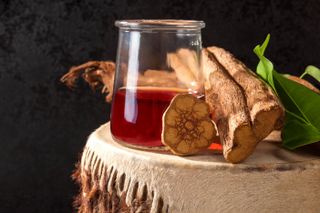Does Drinking Ayahuasca Really Feel Like a Near-Death Experience?

The edge of death is a lot like drinking a cup of tea.
That, more or less, is the conclusion of a paper published yesterday (Aug. 15) in the journal Frontiers in Psychology.
Of course, it depends on the tea. The researchers were focused on ayahuasca — a tea from South America with intense, short-lived hallucinogenic effects. In the study, 13 healthy volunteers were intravenously given N,N-Dimethyltryptamine (DMT), the most potent active ingredient in the brew. Then, while still on the drug, the volunteers answered a questionnaire, designed in the early 1980s, that aims to determine whether someone has gone through a "near-death experience," an intense psychological state believed to occur very close to death.
The researchers compared the volunteers' answers with the answers they had given earlier, after taking a placebo. The researchers also compared the questionnaire answers to responses from 13 separate volunteers who had reported a near-death experience, or NDE. The result?
"All 13 participants [who took DMT] scored above the standard threshold for an NDE," the authors wrote. In other words, it appears that DMT induced something similar to an NDE. [What Happens When You Die?]
What's more, the DMT group scored similarly or more intensely on every question on the NDE questionnaire to people who had experienced actual NDEs, except one: "Did you come to a border or point of no return?"
That, it would seem, is much more a feature of an actual NDE than of taking DMT.
Sign up for the Live Science daily newsletter now
Get the world’s most fascinating discoveries delivered straight to your inbox.
The researchers hope that the study helps shed light on what's going on in the brain during an NDE.
"These findings are important, as they remind us that NDE[s] occur because of significant changes in the way the brain is working, not because of something beyond the brain," lead study author Robin Carhart-Harris, head of the Psychedelic Research Group at Imperial College London, said in a statement. "DMT is a remarkable tool that can enable us to study, and thus better understand, the psychology and biology of dying."
"These data suggest that the well-recognized life-changing effects of both DMT and NDE might have the same neuroscientific basis," study co-author David Nutt, a neuropsychopharmacologist at the same institution who also worked on the paper, said in the statement.
Still, in the paper, the researchers acknowledged that this result is far from definitive, instead presenting it as a fascinating phenomenon requiring further study.
Indeed, not much is really known about the exact nature of NDEs, and while DMT users often claim that using the drug is like dying, there's no direct chemical evidence for a link.
Manoj Doss, a cognitive neuropsychopharmacologist and drug expert at Johns Hopkins University, said he wasn't convinced by the paper's claims.
"If there's one thing that we know, it's that people aren't very good at metacognizing [thinking about what's going on inside their own heads], especially when they're on drugs," he told Live Science.
So it's probably not a good idea, he said, to read too much into how 13 people answered a questionnaire describing their mental states immediately after injecting a potent hallucinogen. (The questionnaire itself was designed in 1983 based on what Doss said was a problematic method of having people describe their own thoughts, based on interviews with 67 people who had reported NDEs.)
"This whole thing is kind of like when people try to tell you about their dreams, and they have all these distortions that they put together," Doss added.
The bigger reason not to read too much into this study, though, is that there's no evidence that DMT is really special, Doss said. While some people have suggested that human brains might produce large amounts of DMT right before death, he said, there's little evidence that this could actually happen. And there's no reason to suspect that the NDE effect is really unique to DMT.
"They're doing [IV injections of DMT], so that's going to be a really fast onset, less than a minute," Doss said. "That's much faster than when people [ingest] other psychedelic drugs, like psilocybin or LSD, when they might have 45 minutes to an hour to get used to it as it sets in."
DMT administered intravenously might feel like a euphoric NDE to people, he said, simply because they're being so quickly and intensely transported from one mental state to another.
To convince Doss that DMT really has any relationship to death, Doss said, researchers would have to give a much larger group of volunteers a range of psychedelic drugs — from the active ingredients in marijuana, to LSD, to more obscure potential hallucinogens — and show that DMT users still reported much more NDE-like experiences than users of other drugs. (The study authors did not return multiple requests for comment.)
So, is a DMT trip really like dying? Or rather, is dying really that much like a DMT trip? Maybe, but not everyone's convinced.
Originally published on Live Science.

